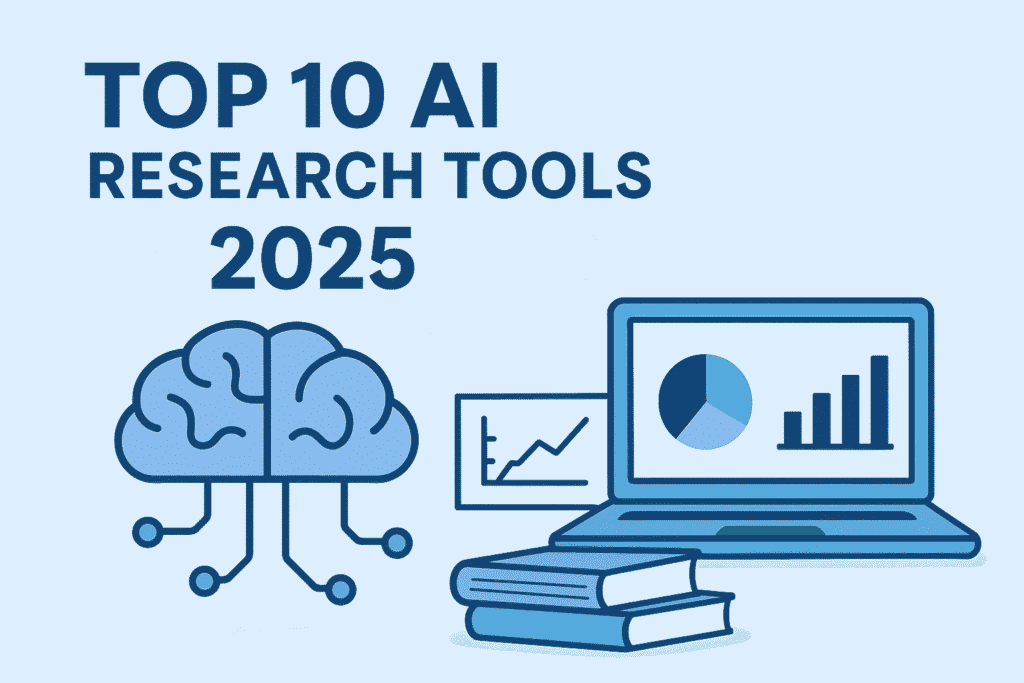Top 10 Lifestyle Tips for a Healthy and Happy Life
Top 10 Lifestyle Tips for a Healthy and Happy Life In today’s fast-moving world, maintaining a healthy and balanced lifestyle…

Artificial Intelligence has established a strong foothold in research in 2025. Researchers across all fields are utilizing AI tools to collect data, summarize complex literature, and save countless hours. Whether you are creating a literature review or analyzing data trends, AI allows you to accomplish these tasks with greater efficiency and intelligence.
AI tools act as virtual research assistants that can find sources, summarize information, and recommend relevant articles. Instead of spending hours searching through databases, researchers can now get structured, evidence-based information within minutes.
When deciding on an AI tool, consider the following factors:

Scite.ai uses AI to analyze how research papers are cited—positively, negatively, or neutrally—helping you evaluate a source’s credibility.
Research Rabbit tool functions like Spotify for research papers. It provides visualizations of citation networks and helps discover related works.
Elicit is a powerful AI tool that automates parts of your literature review. You enter your research question, and it provides summarized insights from relevant papers.
Semantic Scholar Developed by the Allen Institute, Semantic Scholar uses AI to deliver ranked and filtered academic papers by relevance. It sorts results across fields like medicine, AI, and computer science.
ChatGPT is more than a chatbot—it’s a flexible research assistant. You can use it to summarize papers, draft outlines, or simplify complex theories.
Consensus uses AI to extract evidence-based answers directly from research papers. It’s perfect for users who want verified data without manually reading multiple studies.
Jenni AI helps researchers write academic papers faster. It suggests phrases, maintains citation style, and improves tone and flow.
Scholarcy condenses lengthy research papers into easy-to-read summaries and automatically generates reference libraries.
Iris.ai maps out the entire research landscape around your topic, identifying key concepts, related studies, and knowledge gaps.
QuillBot is well-known for paraphrasing, but it’s also excellent for rewriting content for clarity and avoiding plagiarism. It includes a citation generator for easy referencing.
Free AI tools are great for beginners or students on a budget. They help summarize research and assist with writing. Paid options, however, provide advanced analytics, improved citation accuracy, and deeper integration with research workflows — perfect for professionals and academics.
AI can save hours of manual searching, filter credible sources, and organize ideas efficiently. Think of it as your personal research assistant that never sleeps. Whether conducting a meta-analysis or writing your thesis, AI ensures your work stays well-structured and productive.
AI-based research tools are advancing rapidly. By 2030, we may see AI generating complete literature reviews, simulating experiments, or even peer-reviewing papers. The integration of AI will continue making research more data-driven, ethical, and collaborative across disciplines.
AI research tools in 2025 are transforming how we study and write. Whether you’re using Scite.ai to verify sources, Elicit for literature reviews, or ChatGPT for idea generation, these tools make research smarter and faster. Start with free plans to explore your needs, then upgrade as your research deepens.

1. What is the best free AI research tool in 2025?
Elicit.org and Research Rabbit are among the best free tools for students and researchers.
2. Can AI tools replace human researchers?
No. AI supports researchers but cannot replace human reasoning and interpretation.
3. Are AI research tools safe to use?
Yes, most are secure — but avoid uploading confidential or sensitive data.
4. Which AI tool helps with writing papers?
Jenni AI and ChatGPT are excellent for academic writing and editing.
5. How do I choose the right AI research tool?
Consider your needs, features offered, integration options, and budget.
If you’re looking to grow your business with a professional, fast, and SEO-optimized website, Websylix can help you build one today.
Top 10 Lifestyle Tips for a Healthy and Happy Life In today’s fast-moving world, maintaining a healthy and balanced lifestyle…
Digital Detox 2025: How Reduced Screen Time Enhances Mental Health In 2025, our world is more connected and screen-dependent than…
Top Freelancing Skills in Demand 2025 The workplace is changing quickly — and freelancing is at the forefront of this…
© 2025 Websylix. All rights reserved.